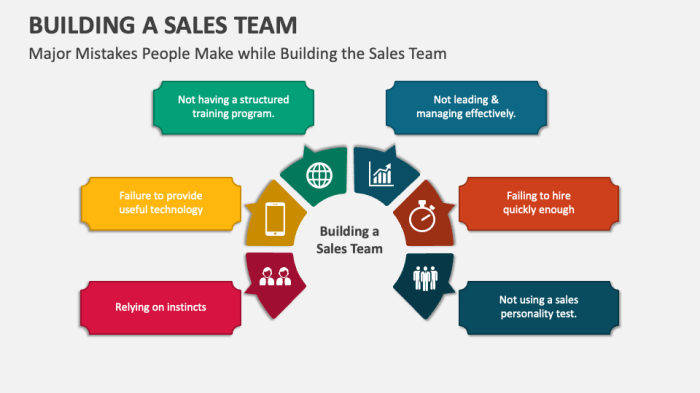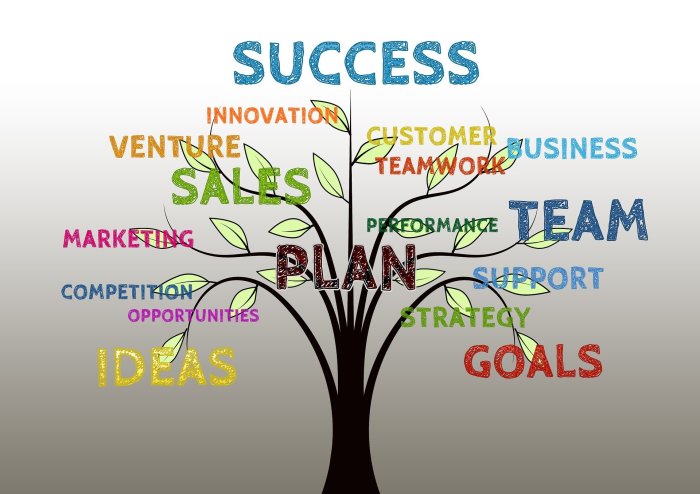Building a Sales Team kicks off the journey to assemble a top-notch sales crew, diving deep into the essentials that make a successful team. Get ready to unlock the secrets of creating a powerhouse sales force that dominates the market.
As we delve into the key components and strategies needed to recruit, train, set goals, and foster a collaborative culture, you’ll be equipped with the tools to build a sales team that drives unprecedented success.
Overview of Building a Sales Team
In the world of business, having a well-structured sales team is crucial for the success and growth of a company. A strong sales team can significantly impact revenue generation, customer acquisition, and overall business performance.
The Key Components Required to Build an Effective Sales Team, Building a Sales Team
Building an effective sales team involves several key components that work together to drive success:
- Recruitment of top talent: Hiring individuals with the right skills, experience, and attitude is essential for building a successful sales team. Look for candidates who are motivated, competitive, and have a strong work ethic.
- Training and development: Providing ongoing training and development opportunities for your sales team is crucial for keeping their skills sharp and ensuring they are equipped to meet the challenges of the market.
- Clear goals and expectations: Setting clear goals and expectations for your sales team helps them stay focused and motivated. Make sure they understand what is expected of them and how their performance will be measured.
- Effective communication: Open and transparent communication within the sales team and with other departments is key to fostering collaboration and ensuring everyone is aligned towards common goals.
- Incentives and rewards: Offering incentives and rewards for top performers can help motivate your sales team to achieve their targets and exceed expectations.
The Benefits of Investing in a Strong Sales Team
Investing in a strong sales team can lead to a range of benefits for your business:
- Increased revenue: A high-performing sales team can drive revenue growth by closing more deals and expanding the customer base.
- Improved customer satisfaction: A well-trained and motivated sales team can provide excellent customer service, leading to higher customer satisfaction and loyalty.
- Market expansion: A strong sales team can help your business enter new markets, reach new customers, and explore new opportunities for growth.
- Competitive advantage: A well-structured sales team can give your business a competitive edge by outperforming rivals and capturing a larger share of the market.
Recruiting Sales Team Members

When building a successful sales team, it is crucial to identify individuals with the right skills and qualities to drive results. Here are some key factors to consider when recruiting sales team members:
Essential Skills and Qualities
- Strong communication skills: Sales professionals should be able to effectively communicate with clients and team members.
- Resilience: Sales can be a tough and demanding job, so resilience is essential to bounce back from rejection and setbacks.
- Goal-oriented mindset: Sales team members should be focused on achieving targets and driving revenue.
- Ability to build relationships: Building trust and rapport with clients is crucial for closing deals.
Strategies for Attracting Top Sales Talent
- Offer competitive compensation and benefits: Top sales professionals are often motivated by financial rewards.
- Provide opportunities for growth and advancement: Talented salespeople want to see a clear path for career development.
- Utilize social media and networking: Engage with potential candidates on platforms like LinkedIn to attract top talent.
Significance of Cultural Fit
Ensuring a cultural fit is essential when recruiting sales professionals as it impacts team dynamics and overall performance. Sales team members should align with the values and work ethic of the organization to foster a positive and productive work environment.
Training and Development: Building A Sales Team
Training and development are crucial aspects of building a successful sales team. A comprehensive training program can help new sales team members get up to speed quickly and effectively.
Importance of Ongoing Training
Ongoing training is essential for the sales team to stay updated on the latest industry trends, product knowledge, and sales techniques. It helps them adapt to changing market conditions and customer needs.
- Regular training sessions can boost morale and motivation among sales reps.
- Continuous learning can enhance the team’s performance and productivity.
- Training helps in refining selling skills and overcoming common sales challenges.
Professional Development for the Sales Team
Investing in the professional development of your sales team can lead to long-term success and growth for your business.
- Encourage sales reps to attend industry conferences and workshops to expand their knowledge.
- Provide opportunities for advanced sales training to help them master new techniques.
- Offer mentorship programs to help sales reps learn from seasoned professionals within the company.
Coaching and Mentoring Sales Reps
Coaching and mentoring play a vital role in improving the performance of sales reps and helping them reach their full potential.
- Regular one-on-one coaching sessions can provide personalized feedback and guidance to sales reps.
- Mentoring programs can help junior sales reps learn from the experiences and expertise of senior team members.
- Encourage a culture of continuous feedback and support to foster a growth mindset among the sales team.
Setting Sales Goals and KPIs
Setting sales goals and key performance indicators (KPIs) is crucial for the success of a sales team. It provides direction, motivation, and a way to measure progress effectively.
Establishing Realistic Sales Goals and KPIs
- Set specific, measurable, achievable, relevant, and time-bound (SMART) goals for the team.
- Consider past performance, market trends, and growth potential when determining targets.
- Collaborate with team members to ensure buy-in and commitment to the goals set.
Aligning Individual Goals with Overall Sales Team Objectives
- Ensure that individual sales goals contribute to the overall team goals and objectives.
- Communicate clearly how each team member’s efforts impact the collective success of the team.
- Create a supportive and collaborative environment where team members work together towards a common goal.
Tracking and Measuring Sales Team Performance
- Utilize sales tracking software and tools to monitor progress towards goals in real-time.
- Regularly review performance data and provide feedback to team members to help them stay on track.
- Celebrate achievements and milestones to boost morale and motivation within the team.
Building a Collaborative Sales Culture

Creating a collaborative sales culture is crucial for the success of a sales team. It fosters teamwork, enhances communication, and boosts morale, ultimately leading to increased productivity and sales performance.
The Importance of Collaboration
Collaboration within a sales team is essential as it encourages sharing of ideas, best practices, and strategies. It helps team members leverage each other’s strengths and expertise, leading to a more holistic approach to sales.
Strategies for Promoting Teamwork
- Encourage open communication channels to facilitate sharing of information and feedback.
- Organize team-building activities to strengthen relationships and foster camaraderie.
- Implement a mentorship program where experienced team members can guide and support newer members.
- Recognize and celebrate team achievements to boost morale and motivation.
Tips for Creating a Positive Sales Culture
- Lead by example by demonstrating collaboration and teamwork in your own interactions.
- Encourage a growth mindset where team members are open to learning and development.
- Promote a supportive environment where team members feel comfortable asking for help and sharing their challenges.
- Provide ongoing training and development opportunities to help team members grow both personally and professionally.





